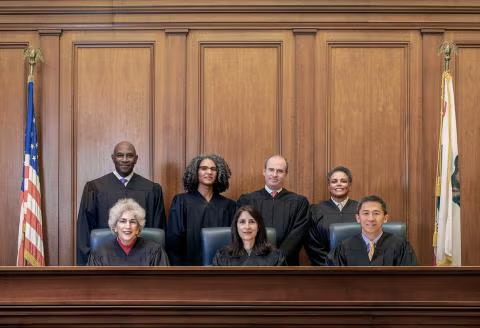Supreme Court: Employers Must Accommodate Employees’ Religious Practices
The U.S. Supreme Court recently clarified the extent of an employer’s obligations to accommodate employees’ religious practices – such as allowing an employee to take certain days off or to wear specific clothing items. In some cases, employers will now have to do more than in the past to avoid violating federal civil rights laws.
The Groff v. DeJoy Decision
The plaintiff in Groff v. DeJoy is an evangelical Christian, formerly employed by the U.S. Postal Service. He believes Sundays should be reserved for rest and worship – and not for work. When he started his job in 2012, employees in his position were rarely if ever expected to work on Sunday. But over the next few years, USPS began contracting with Amazon to deliver packages on Sunday. The Amazon delivery program expanded, and in 2016, USPS informed Groff he would be assigned on a rotating basis to work some Sundays and holidays. Rather than accept the new schedule, he requested and received a transfer to a small, rural post office that, at the time, did not make Sunday deliveries.
Alas, even rural areas are not immune to the charms of free two-day delivery, and Groff’s new post office started making Sunday deliveries in 2017. With Groff unwilling to work on Sundays, USPS made other arrangements. During the peak season, Sunday deliveries that would have otherwise been performed by Groff were carried out by the rest of the staff, including the postmaster, whose typical job duties do not include making deliveries. During other months, Sunday shifts that otherwise would have been worked by Groff were assigned to other mail carriers.
Groff’s coworkers, unsurprisingly, were dissatisfied with this arrangement, and at least one filed a formal grievance. Meanwhile, Groff received disciplinary warnings and write-ups for insubordination due to his refusal to work Sundays. He ultimately resigned, believing (correctly, apparently) he was about to be fired. He later sued, claiming USPS violated Title VII of the Civil Rights Act of 1964 by failing to accommodate his observance of the Sabbath.
Title VII of the Civil Rights Act of 1964
Title VII requires employers to accommodate their workers’ religious practices unless doing so would impose an “undue hardship on the conduct of the employer’s business.” An earlier Supreme Court case, Trans World Airlines, Inc. v. Hardison, described an undue hardship as an effort or cost that is “more than … de minimis.” According to Court in Groff, one definition of “de minimis” is something “so very small or trifling” that it is “not even worth noticing.”
This de minimis standard had allowed employers to resist even seemingly easy and obvious accommodations without incurring any liability. The Court cited examples of an employer terminating a Muslim employee whose religious observance would have conflicted with two hours a week of a month-long training program and another refusing to hire a Sikh man because the employer feared the man’s beard would conflict with its customers’ preferences. These types of practices led several religious groups to urge the court to abandon the de minimis standard because it posed a barrier to their employment opportunities.
The Groff Court agreed, holding that the de minimis standard is inconsistent with the requirement of an “undue hardship” to justify a failure to accommodate an employee’s religious practice. An undue hardship is a burden, cost, or adversity that is excessive or unjustifiable. Stated differently, to comply with Title VII an employer denying a religious accommodation must show that the burden of granting an accommodation would result in “substantial increased costs in relation to the conduct of its particular business.” In determining whether an employer has made this showing, courts will consider they types of accommodations at issue and their practical impact on the business, taking into account the size and revenues of the business.
What Employers Should Do Now
As a result of the U.S. Supreme Court’s decision in Groff, employers now have a heightened responsibility to accommodate employees’ religious practices. Although the Court did not give clear rules on what religious accommodations are required, it did give some helpful guidelines:
— First, existing EEOC guidance on accommodations that do not impose undue hardship (such as allowing voluntary shift swapping) remains valid. Thus, employers should carefully review the EEOC guidance which we’ve linked to below and refer to it when considering an employee’s request for a religious accommodation.
— Second, when possible, an employer confronting an employee’s request for a religious accommodation should consider more than one possible accommodation. For instance, if an employee’s religious observance would require him to be away from work, is there a low-cost incentive that could entice other workers to voluntarily cover the shift? Or are there tasks that the employee could do off-site and/or during hours other than his regular schedule?
— Finally, the impact of a proposed accommodation on other employees may, or may not, create an undue hardship. Impacts on coworker certainly can burden the conduct of the employer’s business. As Justice Sotomayor noted, “for many businesses, labor is more important to the conduct of the business than any other factor.” However, the Groff Court made clear that other employees’ mere dislike of a particular accommodation, or their hostility toward a particular religion, toward religion in general, or toward “religious practice and expression in the workplace,” cannot be considered an undue hardship. Thus, employers who conclude that a particular religious accommodation would impose an undue hardship on the business must cite to some burden other than the reaction of other employees. For example, allowing an employee to take Sundays off could be an undue hardship for a very small company generating limited profits –particularly if the accommodation would require one or two other employees to work every Sunday to cover that absence – but probably would not be an undue hardship for a larger employer with hundreds of employees.
You can read the U.S. Supreme Court’s decision in Groff v. DeJoy here.
You can read the U.S. Supreme Court’s decision in Trans Word Airlines, Inc. v. Hardison here.
You can read the EEOC’s religious discrimination guidelines here.
Insights
OUR BLOG


